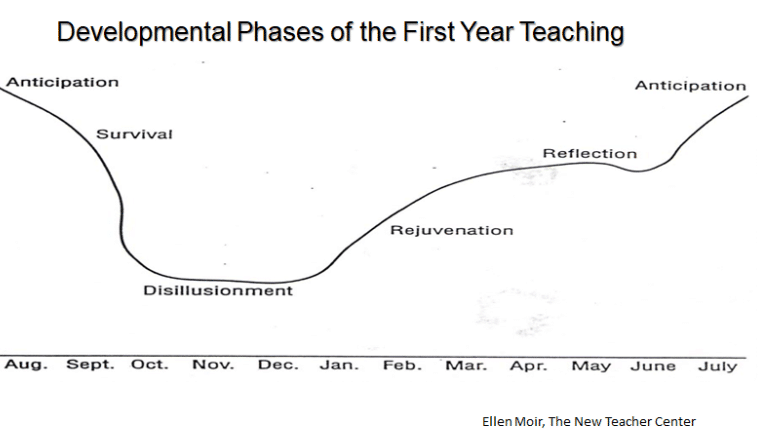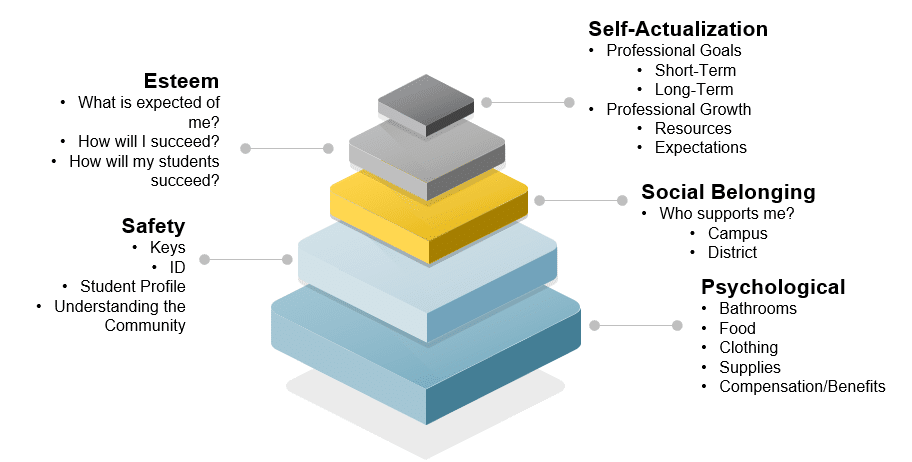DEVOLSON or the Dark Evil Vortex of Late September October and November is a popular (or infamous) phenomenon amongst teachers. Ellen Moir, founder of the New Teacher Center, surveyed thousands of teachers on their sentiment about teaching throughout the year. What the internet has coined “DEVOLSON,” Moir called the “Disillusionment” phase of the school year. Unfortunately, this phenomenon isn’t only true for new teachers. When teachers are enduring DEVOLSON, coaches who are working with them need to adapt their support. Here are four things to consider when coaching teachers in difficult times, whether it’s during DEVOLSON or any other time of the year.

#1 When thinking about your coaching relationships during DEVOLSON, consider what you know about Maslow. Are teachers feeling safe? Do they feel a sense of social belonging at work? Do they know how to get their “basic needs” met? If not, there’s little chance you’re going to be able to coach them to learn any new instructional skill or content.

#2 This is a great time to invest in your coaching relationship. Things that seem insignificant, like bringing someone a cup of coffee or covering their lunch duty, can be great “deposits” in your “relationship bank account” that will make it easier to have harder conversations down the road. Find a way to do something to help meet the teacher’s basic needs (see #1) during DEVOLSON; it’ll pay off in the Spring. Check in frequently with teachers to show your investment in this relationship. See how they’re doing and provide them with some positive encouragement during this difficult season.
#3 DEVOLSON is not the time to focus on new learning or difficult-to-achieve goals. Spend this time celebrating early success and capturing low hanging fruit. In other words, help them to earn some quick and easy wins to build their confidence.
#4 You might need to adapt the way you approach coaching conversations during this time. In some cases, it will be more appropriate to be more “Instructive” than “Facilitative” during this difficult time. But being “Instructive” doesn’t necessarily mean being “Directive.” Just consider the cognitive lift required of the teacher to learn something new at this time. If the lift is heavy, save it for later in the year.
Take advantage of Sibme’s expert coaches to provide instructive, clear guidance, tailored to the teacher’s immediate needs, and defer more complex skill development until a more suitable time.
How Sibme Can Help
Sibme offers tools and services designed to support teachers through challenging times, such as DEVOLSON:
Sibme AI
Personalized Feedback: Sibme AI provides instant, tailored feedback on teaching practices, reducing the cognitive load on teachers by quickly highlighting strengths and suggesting improvements.
Resource Recommendations: It curates resources and strategies aligned with individual teacher needs, helping educators focus on achievable goals and quick wins during this demanding period.
Use Sibme AI to identify areas where teachers might need emotional or professional support, ensuring their basic needs are addressed.
Utilize Sibme’s communication features to maintain regular check-ins with teachers, strengthening your relationship bank account through consistent, positive interactions.
Sibme Virtual Coaching
Flexible Support: Sibme’s virtual coaching adapts to teachers’ schedules, offering timely support without adding to their workload.
Expert Guidance: Access to experienced coaches provides teachers with clear, instructive guidance when they need it most, reinforcing the focus on basic needs and relationship-building.
Collaborative Reflection: Facilitates reflective practices that allow teachers to celebrate small victories, fostering a sense of accomplishment even amidst difficulty.

